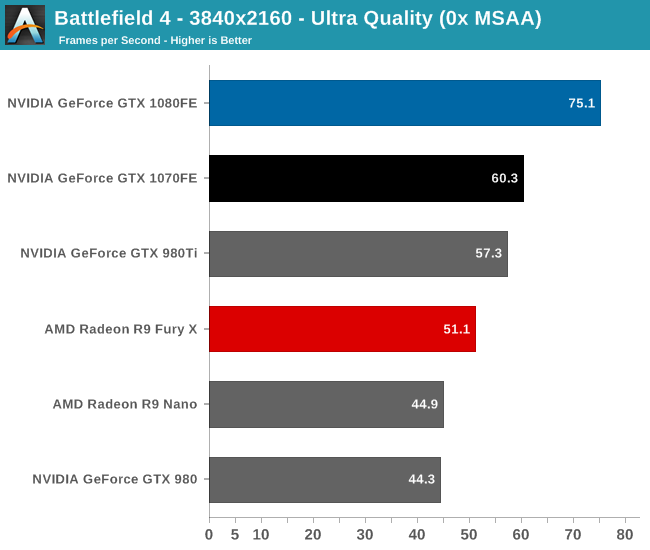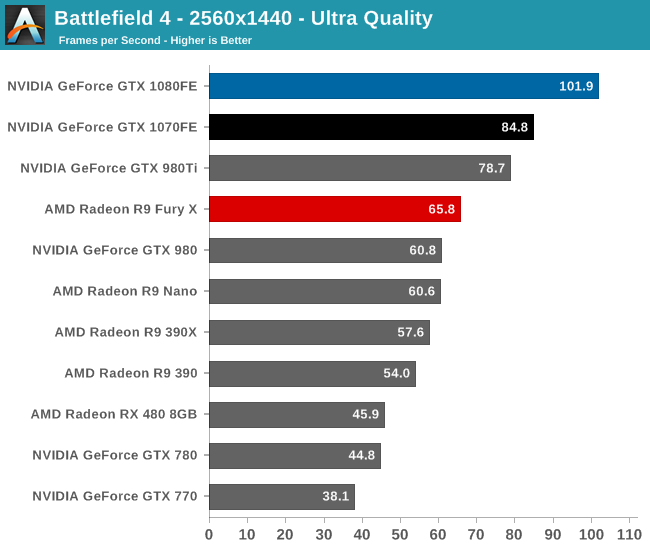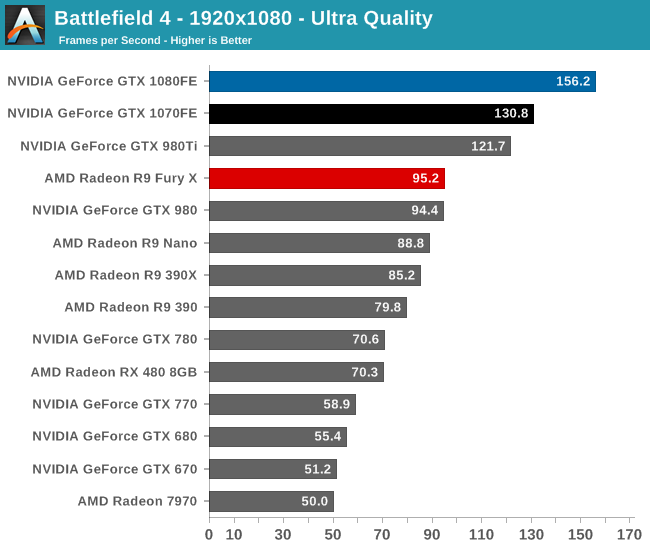The NVIDIA GeForce GTX 1080 & GTX 1070 Founders Editions Review: Kicking Off the FinFET Generation
by Ryan Smith on July 20, 2016 8:45 AM ESTBattlefield 4
One of the older games in our benchmark suite, DICE’s Battlefield 4 remains a staple of MP gaming. Even at its age, Battlefield 4 remained a challenging game in its own right, as very few mass market MP shooters push the envelope on graphics quality right now. As these benchmarks are from single player mode, based on our experiences our rule of thumb here is that multiplayer framerates will dip to half our single player framerates, which means a card needs to be able to average at least 60fps if it’s to be able to hold up in multiplayer.



As a game that has traditionally favored NVIDIA, Battlefield 4 makes for a very clean sweep of the field. The GTX 1080 takes top honors with the GTX 1070 some distance behind it. Notably, the two Pascal cards become the first cards to cross 60fps at 4K, which means that they’re the first cards we can be reasonably sure won’t have framerate dips below 30fps in multiplayer.
Looking at our standard generational comparisons, both GTX 1080 and GTX 1070 improve upon their predecessors by about what we’d expect; 67% and 58% respectively. Or to see how GTX 1080 and GTX 1070 compare, we find that the GTX 1080 leads its cut-down sibling by between 20% and 25%, with the gap increasing with the resolution. This is consistent with what we know about GTX 1080, as its bandwidth advantage means that it’s going to have an easier time pushing pixels at 4K, as the case is here.
Finally, to check in on the GTX 680, we find the GTX 1080 has only improved in performance by 2.8x, which is actually a bit less of a gain than the average. None the less we’ve gone from a card that can’t quite muster 1080p with 4xMSAA to a card that can easily handle 4K without any MSAA.










200 Comments
View All Comments
DonMiguel85 - Wednesday, July 20, 2016 - link
Agreed. They'll likely be much more power-hungry, but I believe it's definitely doable. At the very least it'll probably be similar to Fury X Vs. GTX 980sonicmerlin - Thursday, July 21, 2016 - link
The 1070 is as fast as the 980 ti. The 1060 is as fast as a 980. The 1080 is much faster than a 980 ti. Every card jumped up two tiers in performance from the previous gen. That's "standard" to you?Kvaern1 - Sunday, July 24, 2016 - link
I don't think there's much evidence pointing in the direction of GCN 4 blowing Pascal out of the water.Sadly, AMD needs a win but I don't see it coming. Budgets matter.
watzupken - Wednesday, July 20, 2016 - link
Brilliant review. Thanks for the in depth review. This is late, but the analysis is its strength and value add worth waiting for.ptown16 - Wednesday, July 20, 2016 - link
This review was a L O N G time coming, but gotta admit, excellent as always. This was the ONLY Pascal review to acknowledge and significantly include Kepler cards in the benchmarks and some comments. It makes sense to bench GK104 and analyze generational improvements since Kepler debuted 28nm and Pascal has finally ushered in the first node shrink since then. I guessed Anandtech would be the only site to do so, and looks like that's exactly what happened. Looking forward to the upcoming Polaris review!DonMiguel85 - Wednesday, July 20, 2016 - link
I do still wonder if Kepler's poor performance nowadays is largely due to neglected driver optimizations or just plain old/inefficient architecture. If it's the latter, it's really pretty bad with modern game workloads.ptown16 - Wednesday, July 20, 2016 - link
It may be a little of the latter, but Kepler was pretty amazing at launch. I suspect driver neglect though, seeing as how Kepler performance got notably WORSE soon after Maxwell. It's also interesting to see how the comparable GCN cards of that time, which were often slower than the Kepler competition, are now significantly faster.DonMiguel85 - Thursday, July 21, 2016 - link
Yeah, and a GTX 960 often beats a GTX 680 or 770 in many newer games. Sometimes it's even pretty close to a 780.hansmuff - Thursday, July 21, 2016 - link
This is the one issue that has me wavering for the next card. My AMD cards, the last one being a 5850, have always lasted longer than my NV cards; of course at the expense of slower game fixes/ready drivers.So far so good with a 1.5yrs old 970, but I'm keeping a close eye on it. I'm looking forward to what VEGA brings.
ptown16 - Thursday, July 21, 2016 - link
Yeah I'd keep an eye on it. My 770 can still play new games, albeit at lowered quality settings. The one hope for the 970 and other Maxwell cards is that Pascal is so similar. The only times I see performance taking a big hit would be newer games using asynchronous workloads, since Maxwell is poorly prepared to handle that. Otherwise maybe Maxwell cards will last much longer than Kepler. That said, I'm having second thoughts on the 1070 and curious to see what AMD can offer in the $300-$400 price range.